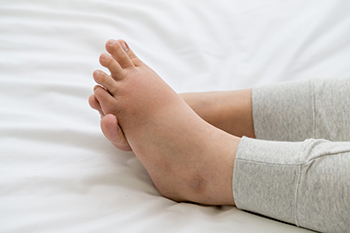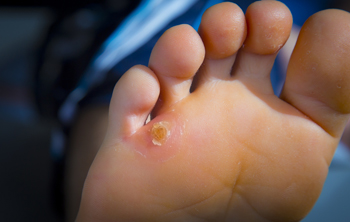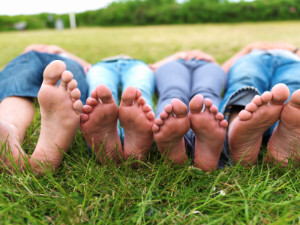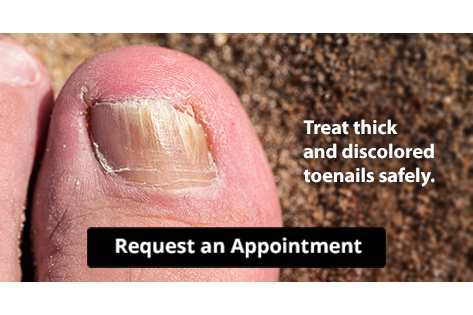Connect With Us
Blog
Items filtered by date: June 2023
Sore and Swollen Feet During Pregnancy

Many women experience discomfort during their pregnancy, and their feet are often affected. Foot pain and swelling often happen in the second or third trimester, making it difficult to complete daily tasks. The noticeable weight gain may cause plantar fasciitis to develop, as a result of the extra weight the heel and arches have to bear. This is a condition that targets the plantar fascia and causes it to become torn or inflamed. Edema is the medical term for swollen feet and is common among pregnant women. It happens from the extra fluids that the body naturally produces to support the growing fetus, and may pool in the feet and ankles. Foot pain may be managed by performing daily stretches which can help to increase blood flow and diminish soreness. Swollen feet may be helped by reducing sodium intake, and drinking plenty of water daily. If your pregnancy causes you to have foot pain or swollen feet, it is suggested that you speak to a podiatrist who can offer you additional relief options.
Pregnant women with swollen feet can be treated with a variety of different methods that are readily available. For more information about other cures for swollen feet during pregnancy, consult with one of our podiatrists from Comprehensive Foot & Ankle Center. Our doctors will attend to all of your foot and ankle needs.
What Foot Problems Can Arise During Pregnancy?
One problem that can occur is overpronation, which occurs when the arch of the foot flattens and tends to roll inward. This can cause pain and discomfort in your heels while you’re walking or even just standing up, trying to support your baby.
Another problem is edema, or swelling in the extremities. This often affects the feet during pregnancy but tends to occur in the later stages.
How Can I Keep My Feet Healthy During Pregnancy?
- Wearing orthotics can provide extra support for the feet and help distribute weight evenly
- Minimize the amount of time spent walking barefoot
- Wear shoes with good arch support
- Wear shoes that allow for good circulation to the feet
- Elevate feet if you experience swelling
- Massage your feet
- Get regular, light exercise, such as walking, to promote blood circulation to the feet
If you have any questions please feel free to contact our offices located in Lehigh Ave and Nazareth Hospital in Philadelphia, Collegeville Darby, and Langhorne, PA . We offer the newest diagnostic and treatment technologies for all your foot and ankle needs.
Hard and Soft Corns

A corn on the foot can cause pain that can be so severe many people change their gait, or walking style, to compensate for their discomfort. A corn is a small area of hardened skin that forms on the side of the pinky toe, on top of the toes, or the bottom of the foot. It happens due to wearing shoes that do not fit correctly, and the constant motion of the toe rubbing against the shoe can cause that area to become red and uncomfortable. It naturally forms as a defense mechanism to protect the skin from further damage. Many people who wear high heels can develop corns and may choose to wear a protective pad on top of the corn. Relief may be found when larger shoes are worn and the pressure is relieved. Hard corns look white in appearance and can have a center to them. Soft corns can develop between the toes as a result of moisture that accumulates in that area. If you have developed a corn on your foot, it is suggested that you visit a podiatrist who can offer you effective prevention and relief techniques.
Corns can make walking very painful and should be treated immediately. If you have questions regarding your feet and ankles, contact one of our podiatrists of Comprehensive Foot & Ankle Center. Our doctors will treat your foot and ankle needs.
Corns: What Are They? And How Do You Get Rid of Them?
Corns are thickened areas on the skin that can become painful. They are caused by excessive pressure and friction on the skin. Corns press into the deeper layers of the skin and are usually round in shape.
Ways to Prevent Corns
There are many ways to get rid of painful corns such as:
- Wearing properly fitting shoes that have been measured by a professional
- Wearing shoes that are not sharply pointed or have high heels
- Wearing only shoes that offer support
Treating Corns
Although most corns slowly disappear when the friction or pressure stops, this isn’t always the case. Consult with your podiatrist to determine the best treatment option for your case of corns.
If you have any questions please feel free to contact our offices located in Lehigh Ave and Nazareth Hospital in Philadelphia, Collegeville Darby, and Langhorne, PA . We offer the newest diagnostic and treatment technologies for all your foot and ankle needs.
Increasing Balance to Prevent Running Injuries

Any runner knows that preventing a running injury by looking after the health of the feet is an essential part of being a good runner. One way in which a runner can do this is by performing balance enhancing stretches. For example, to improve balance, a runner may consider performing a single leg balance stretch and squat. During this stretch, a runner stands on one leg while slowly and squatting repeatedly. By doing this stretch, a runner can essentially improve the extent to which they land evenly on each foot while running. If you are a runner looking to prevent the onset of running injuries, then it is suggested that you confer with a podiatrist today for advice and possible treatment.
All runners should take extra precaution when trying to avoid injury. If you have any concerns about your feet, contact one of our podiatrists of Comprehensive Foot & Ankle Center. Our doctors will treat your foot and ankle needs.
How to Prevent Running Injuries
There are a lot of mistakes a runner can make prior to a workout that can induce injury. A lot of athletes tend to overstretch before running, instead of saving those workouts for a post-run routine. Deep lunges and hand-to-toe hamstring pulls should be performed after a workout instead of during a warmup. Another common mistake is jumping into an intense routine before your body is physically prepared for it. You should try to ease your way into long-distance running instead of forcing yourself to rush into it.
More Tips for Preventing Injury
- Incorporate Strength Training into Workouts - This will help improve the body’s overall athleticism
- Improve and Maintain Your Flexibility – Stretching everyday will help improve overall performance
- “Warm Up” Before Running and “Cool Down” Afterward – A warm up of 5-10 minutes helps get rid of lactic acid in the muscles and prevents delayed muscle soreness
- Cross-Training is Crucial
- Wear Proper Running Shoes
- Have a Formal Gait Analysis – Poor biomechanics can easily cause injury
If you have any questions, please feel free to contact our offices located in Lehigh Ave and Nazareth Hospital in Philadelphia, Collegeville Darby, and Langhorne, PA . We offer the newest diagnostic and treatment technologies for all your foot care needs.
Stop Your Toenail Fungus
Feet Smell in Children

Caring for a child can present a whole host of challenges to new parents. One of these challenges is caring for the child’s feet. Some new parents might notice that their child’s feet have an unpleasant odor. Importantly, many children experience this phenomenon. There are a number of different reasons for this. For example, many children are highly physically active and sweat significantly, which can lead to smelly feet. There are steps, however, that parents can take to mitigate smelly feet in their children. Most importantly, parents can help their children keep their feet clean and dry. Parents might also even wash and dry their child’s shoes regularly. This prevents the accumulation of bacteria in the shoes. If you are the parent of a child and are looking to protect the health of their feet, it is suggested that you contact a podiatrist for an appointment.
Making sure that your children maintain good foot health is very important as they grow. If you have any questions, contact one of our podiatrists of Comprehensive Foot & Ankle Center. Our doctors can provide the care you need to keep you pain-free and on your feet.
Keeping Children's Feet Healthy
Having healthy feet during childhood can help prevent medical problems later in life, namely in the back and legs. As children grow, their feet require different types of care. Here are some things to consider...
Although babies do not walk yet, it is still very important to take care of their feet.
Avoid putting tight shoes or socks on his or her feet.
Allow the baby to stretch and kick his or her feet to feel comfortable.
As a toddler, kids are now on the move and begin to develop differently. At this age, toddlers are getting a feel for walking, so don’t be alarmed if your toddler is unsteady or ‘walks funny’.
As your child gets older, it is important to teach them how to take care of their feet.
Show them proper hygiene to prevent infections such as fungus.
Be watchful for any pain or injury.
Have all injuries checked by a doctor as soon as possible.
Comfortable, protective shoes should always be worn, especially at play.
If you have any questions please feel free to contact our offices located in Lehigh Ave and Nazareth Hospital in Philadelphia, Collegeville Darby, and Langhorne, PA . We offer the newest diagnostic and treatment technologies for all your foot and ankle needs.

